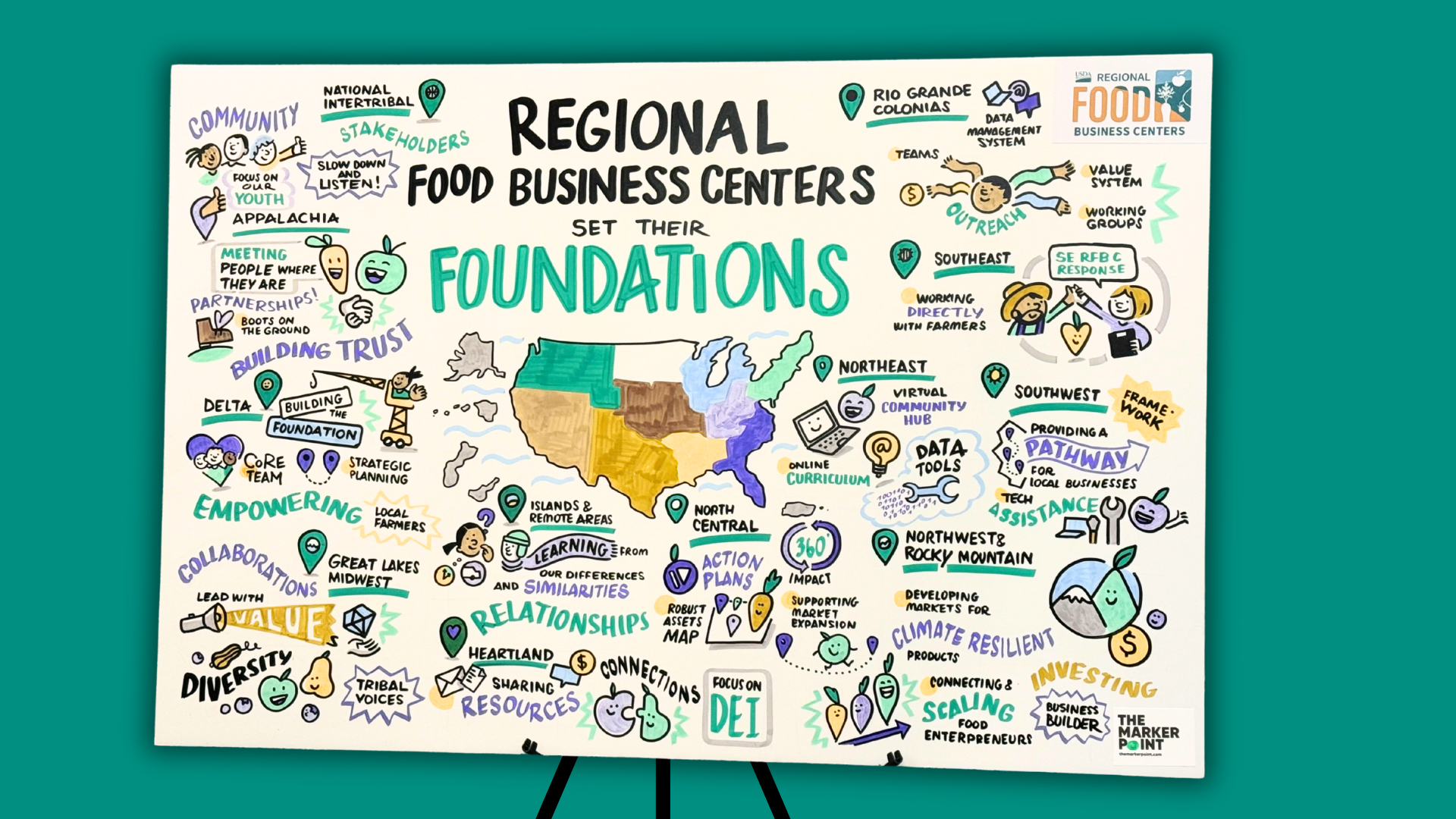In July 2025, the USDA announced the termination of all Regional Food Business Centers (RFBCs), including the Northwest Rocky Mountain Center (Colorado, Idaho, Montana, Oregon, Washington, and Wyoming), where The Food Corridor served as co-lead for the Connecting and Scaling Food Entrepreneurs Theme Team.
This decision marked the end of a transformative chapter — but it’s not the end of our movement.
(Check my LinkedIn Post for my professional opinion on this short-sighted decision.)
Putting Shared Kitchens at the Center
Our work with the RFBC was grounded in one belief: shared-use kitchens are not a fringe idea — they are the foundation for a more resilient, inclusive, and scalable local food economy.
As co-lead of the Connecting and Scaling Food Entrepreneurs Theme Team, The Food Corridor helped shape a regional strategy that placed shared kitchens and food hubs at the center of investment and innovation.
Together with our partners, we launched and delivered impactful programming across six states, establishing over 2,400 new partnerships and providing technical assistance to 504 farm and food businesses.
And we’re proud to share what that looked like in action.

Business Builder Grants: Infrastructure That Multiplies Impact
Our Business Builder Grant program was bold by design. We didn’t fund individual food businesses. Instead, we strategically decided to fund shared-use and community-based infrastructure that could lift multiple entrepreneurs at once, multiplying impact and investment.
Thanks to our amazing partners, our Theme Team awarded $457,351 across 16 projects to improve shared kitchen and food hub infrastructure, support underinvested communities, and increase regional food system capacity.
From cold storage and forklifts to co-packing and kitchen builds, these grants were designed to solve real operational barriers while unlocking shared capacity. Each project was selected not just for what it builds, but for whom it helps — food entrepreneurs working hard to grow their ideas into sustainable businesses.
Several of the funded projects are unlocking significant production and revenue potential for local food businesses. In one case, freeze-drying capacity was doubled, enabling the processing of tens of thousands of pounds of product annually and generating substantial new revenue for a network of small farms. Other grants supported the development of new commercial kitchen spaces in rural and underserved areas, helping fill long-standing infrastructure gaps and offering critical space for value-added processing where none previously existed.
Beyond bricks and mortar, the grants are creating measurable ripple effects across the regional food system. Investments in commercial refrigeration, forklifts, and co-packing equipment are enabling kitchens to boost safety, scale production, and respond more effectively during emergencies. Some projects are expanding delivery and pickup routes across county lines, increasing access to local food and new markets. Many of the funded kitchens serve diverse groups of entrepreneurs, helping to reduce production time, lower costs, and support business growth. Each investment strengthens not only the physical infrastructure but also the broader ecosystem that supports inclusive, resilient, and thriving food entrepreneurship.
A very special acknowledgment to Rebecca Cashero, Audrey Welsh, and Lauren Gwin for designing the foundation of the Business Builder Grant program. Their thoughtful and ambitious structure ensured that we balanced local context and need with programmatic clarity and effectiveness — a model that, despite its massive undertaking, was easy to implement, communicate, and measure. Their scaffolding allowed us to move real resources to real projects and people with speed and care.

Numbers That Tell a Bigger Story
Beyond the Business Builder Grants, our Theme Team:
-
Connected 48+ companies with national buyers at four national Fancy Food Shows
-
Supported 48+ companies completing the Getting Your Recipe to Market course
-
Launched the Meaningful Marketplace Podcast, which will reach 96 episodes by year’s end, deemed the “How I Built This” for food entrepreneurs — with Sarah Masoni and Sarah Marshall instead of Guy Roz
-
Brought kitchen operators from all six states to the Shared Kitchen Summit in New Orleans, with more headed to Cleveland this November
-
Upgraded, launched, and disseminated the Shared Kitchen Operator Toolkit 2.0
-
Provided technical product development and business assistance to hundreds of entrepreneurs supported by the Food Innovation Center
-
Delivered in-state trainings, Shared Kitchen 101 workshops, and provided vendor booth fee support for underserved food businesses to reach new markets
-
And much more.
As our Center’s 12-month progress report from 2024 outlined, we were just getting started. But looking back, we’ve achieved so much. Bravo!

A Heartfelt Thank You
None of this would have been possible without the vision and trust of our RFBC leadership.
Thank you to Dawn Thilmany McFadden, Lauren Gwin, and Martha Sullins for giving us a seat at the table and helping center farm and food businesses that operate in shared kitchens be part of this vital work.
To the incredible RFBC staff, thank you for building the ship as we sailed it. Your behind-the-scenes dedication made this initiative real. (And shout out to Matt McFadden at MM Outreach Solutions for creating a beautiful and functional website!)
And to our state and regional partners, thank you for carrying this work to your communities and shaping solutions on the ground. We are lucky to have visited and learned from so many unique food ecosystems. Knowledge transfer (and friendship building) at its finest.

Additional gratitude to our fellow Theme Team leads – we know what this took and are proud to have braved this challenge alongside you:
-
Rebecca Thistlewaite (Niche Meat Processor Assistance Network) & Tommy Bass (Montana State University) – Building Meat Supply Chain Capacity
-
Colette DePhelps (University of Idaho Extension) & Martha Sullins (Colorado State University Extension) – New Markets for Grain, Pulses & Pseudocereals
-
Amy Mattias (Sun Valley Institute for Resilience) & Sydney DeLuna (Luna Bird) – Right-Size Investing & Infrastructure

And a huge thanks to our Connecting & Scaling Food Entrepreneurs Theme Team partner steering committee who always showed up, asked important questions, and always put the community at the center of the work:
-
Danita Macy, Oregon State University
-
Elisa Wickstrom, Portland Community College
-
Jan Tusick, Mission West Community Development Partners
-
Janna Hamlett, TechHelp Idaho
-
Jill Beaman, Portland Community College
-
Jen Werlin, University of Idaho Extension
-
Kate Smith, Washington State University Extension
-
Lisa McCauley, Independent Consultant
-
Micha Ide, Washington State Department of Agriculture
-
Michael Gabel, Colorado State University
And finally, to Sarah Masoni and Tyler Sangermano — my co-lead and coordinator. We were the perfect trio of creative energy and grounded execution. We distilled ideas into action, led with trust, showed up, iterated based on feedback and learnings, and divided the work with grace and transparency.
“Faith is taking the first step even when you don’t see the whole staircase” – Dr. Martin Luther King.
One of the best teams I’ve ever worked with. So, thank you.

The Work Goes On — Because Relationships Do
While the federal funding is ending, the relationships and collaboration we’ve built will continue.
At The Food Corridor, we say that food is special because it is relational, not transactional. That same philosophy shaped this Center. And that spirit — not a grant line item — is what sustains this work.
It’s been a privilege to build alongside you all, share resources, and deliver programs that lift up local food system entrepreneurs. That impact will live on — because the relationships will.
Introducing KitchenEDU: The Next Chapter
We’re now channeling that same energy into KitchenEDU — our new shared kitchen learning platform and newsletter.
At KitchenEDU, you’ll find:
-
Templates, case studies, and real-world tools
-
Operator spotlights and success stories
-
Industry updates, policy shifts, and funding alerts
-
A little catharsis — like Screaming in the Walk-In (subscribe to our newsletter to access!)
Shared Kitchens Are the Future — Let’s Keep Building
The USDA may have closed a door. But we’re still building the house.
Thank you for being part of this movement. The future of food is shared — and we’re so glad you’re in it with us.
With gratitude and grit,
Ashley, Founder & CEO, The Food Corridor
Co-Lead, Connecting & Scaling Food Entrepreneurs Theme Team
Northwest Rocky Mountain Regional Food Business Center
🔗 Resources

